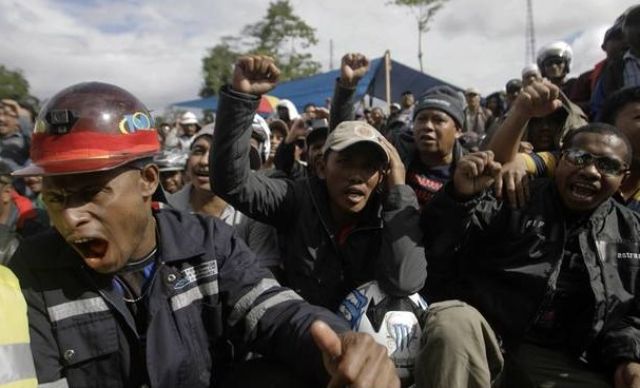
Deadly repression in Indonesia has refocussed attention on the role of Australian mining companies in human rights abuses in the country.
People of the Paniai region in Indonesian-occupied West Papua have lived in terror since November. The Australian government-trained “anti-terrorist” unit Detachment 88 (D88) and Brimob paramilitary force launched an offensive in the area that month to eliminate fighters from the Free Papua Movement (OPM).
The scale of the attacks was “disproportionate” to the small number of poorly armed guerilla fighters involved, West Papua Media said on January 14. This has raised speculation the offensive is linked to gold mining in the area.
The military are alleged to be involved in illegal gold rackets in the area, but the motivation for the assault remains unclear.
WPM said on December 21 that helicopters owned by Paniai Gold, which runs the Sumber Mineral Nusantara mines in the area, were used by Indonesian forces in attacks on villagers.
WPM said on January 14 the helicopters were “used by troops to continue to strafe villages, drop live and gas grenades and ferry troops into the fighting areas”.
Paniai Gold is a subsidiary of Melbourne-based gold mining company West Wits Mining.
Paniai Gold is alleged to have paid Brimob forces to act as security for its mine, WPM said. Neither Paniai Gold nor West Wits Mining have made any comment on the allegations against them.
WPM said on January 14 that about 150 villages had been vacated, with at least 9000 people displaced either due to fear or by force. It said: “Brimob and D88 troops have burnt down 29 churches, 13 primary schools and 2 junior schools, and 13 villages have been destroyed over the New Year period ...
“Brimob and D88 deliberately destroyed and burnt food gardens across the offensive area, and burned down fences designed to keep livestock out. Surviving cattle have been moving freely and have eaten whatever food plants have survived the destruction, stoking fears of starvation for already stressed and displaced local villagers.”
Troops were also alleged to have looted villages, Jubi said on December 23.

Despite the severity of the crackdown, the OPM fighters have declared they will “never surrender”. In a letter published by Jubi on January 7, Paniai OPM leader John Yogi said his troops were armed only with bows and arrows but were able to hold their position and were prepared to confront Indonesian troops.
Yogi said: “All people and groups have basic rights which must be respected by everyone, including the right to self-determination.
“This is the right which we Papuan people demand from the UN who never listened when our rights were trampled upon by the forces of Indonesia and the USA.”
Along with the repression in West Papua, about 700 Brimob troops fired without warning on a group of about 350 protesters in Bima regency on the island of Sumbawa on December 24, killing three and injuring many others, the Sydney Morning Herald said on December 29.
The protesters were calling for the gold mining license of Australian company Arc Exploration to be revoked.
Residents of the area, mainly farmers and fisherpeople, have protested against the mine development for about the past two years. Protests have highlighted the destructive environmental effects the mine will have on the area, Indonesian environmental group Wahli said on December 24.
The protest at Sape port lasted five days before security forces attacked early on December 24, Hidup Biasa said that day. Some protesters were shot while lying down, ABC Online said on December 29.
The actions of Indonesian authorities meant the attack was inevitable, Wahli said. Authorities had ignored calls for consultation and had allegedly hired thugs to provoke violence at a protest in February last year.
Arc Exploration suspended its operations in Bima after the attack, Nasdaq.com said on December 27.
Wahli said it “recorded 103 cases of conflicts over natural resources sectors” across Indonesia last year.
Hidup Biasa reported on December 30 several protests against police brutality across Indonesia, particularly against the attack in Bima.
Another mining dispute ended in December when workers at the Grasberg mine in West Papua won a 40% pay rise after a three-month strike, Reuters said on December 23. About 9000 workers had walked out in September demanding a larger share of the huge profits produced by the mine.
The mine is owned by US company Freeport-McMoRan and Australian company Rio Tinto.
Workers delayed their return to work by a week to ensure they would not be sanctioned by the company for striking, Reuters said.
Several people were killed during the strike, including a worker who was shot by police at a rally. Union leaders reported receiving death threats.
A leader of Lemasa, the Association of Amungme tribal people, declared the Grasberg mine would be “closed down”, Jubi said on January 19.
Anthonius Alomang said: “Ever since Freeport has been present here, what has been happening is quite unacceptable to the people who hold customary rights to the land.
“The people who were already poor have become even poorer, and they have seen that there has been not a shred of compassion in the practices towards the local people. This includes murders by unaccountable groups as well as corruption practised by the Freeport management who have never been called to account for all this.”